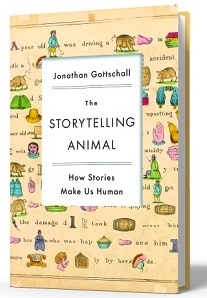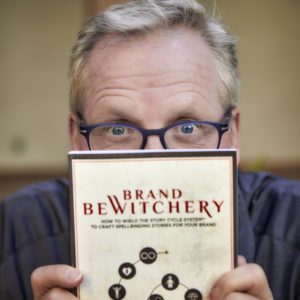Our brains are suckers for story. They’ll take the most benign stimuli (like most powerpoints, car dealership commercials, and mission statements) and attempt to knit narratives from them in an exhaustive effort to make sense of the world.
Here’s a brilliant example: watch this one-minute film, created in 1944, and scribble down what you see. Show it to others and see what stories they create.
Of the 114 test subjects in the Heider/Simmel study who saw this rudimentary film of crude geometric shapes darting around a box, 113 of them fabricated elaborate stories about what was happening between the protagonist and antagonist. Only one subject said it was just shapes moving around. The test has been repeated many times, and the findings remain the same: Our brains are hardwired to generate stories that create supposed order in our world.
Now that you’ve experienced how your mind is constantly subconsciously producing stories that prompt your behavior, overlay this phenomenon with another fundamental human reaction to stimuli that causes us to tell ourselves lies honestly.
The Fundamental Attribution Error

Remember the last time someone cut you off in traffic? What foul names did you call that driver? Or more importantly, what sort of aspersions did you cast upon their character? Did you judge them as a lousy, inconsiderate neanderthal, someone who obviously has the social grace of a musk ox, and who has probably been a jerk since birth?
What if they were really racing to the hospital because their daughter was lying in the back seat bleeding profusely? Or maybe they just broke up with a significant other, or got word that a loved one had just passed away? Maybe they just had to take a piss really, really bad.
Our propensity to knit narratives out of the most basal stimuli also causes us to make snap judgments called fundamental attribution errors. This describes our propensity to over-value personality-based explanations for an observed behavior of others while under-valuing the actual circumstance that is truly affecting the behavior.
We automatically tell ourselves stories, which are typically inaccurate, unless…
…we are being guided by external stories that are relevant, interesting and authentic.
So what stories are you telling about your product, service, cause or company? They better be good, and accurate, because your customers are crafting their own about you as I type. We can’t help it. We’ve survived for thousands of years primarily because we’re expert storytellers. Stories help us make sense of our world, prepare us for danger, and poise us for opportunities. And we’ll make up these stories on the run, whether they’re accurate or not.
 This is but one example of how storytelling drives our lives – “because humans live in landscapes of make-believe” – according to Jonathan Gottschall in his fascinating book, The Storytelling Animal, How Stores Make Us Human.
This is but one example of how storytelling drives our lives – “because humans live in landscapes of make-believe” – according to Jonathan Gottschall in his fascinating book, The Storytelling Animal, How Stores Make Us Human.
“Drawing on the latest research in neuroscience, psychology, and evolutionary biology, Gottschall tells us what it means to be a storytelling animal. Did you know that the more absorbed you are in a story, the more it changes your behavior? That all children act out the same kinds of stories, whether they grow up in a slum or a suburb? That people who read more fiction are more empathetic?”
If you want to learn why our brains are so susceptible to storytelling, and how to start to engage people and create the behavior change you’re looking for, The Storytelling Animal is a must addition to your library.
Finally, what did you see in the video? Please share your story with us in the comments below.











at 12:49 pm
I really love your insights – storytelling is one of our oldest inventions, so it makes sense that it would be of such primal importance.
I do think that leaving a bit of room for the customer to make up some of the story is important. It’s part of what draws people in, I think, and encourages them to forge their own authentic connection.
at 12:56 pm
Couldn’t agree more, Grace. The stories brands tell should ignite the proper stories within the consumer and let them fill out the reset of the narrative to coalesce the brand with their own stories. However, if the brands leave the complete story creation up to the consumer, then they run the risk of the wrong story being told.
Thanks for taking the time to share your thoughts.
at 11:39 pm
[…] for sharing stories and spreading the message – In a blog post I read today entitled “What stories are your customers making up about your brand?” by Phoenix ad agency owner and sustainable storyteller Park Howell (whose son by no […]
at 12:08 am
[…] stories and spread the message about your brand – In a blog post I read today entitled “What stories are your customers making up about your brand?” by Phoenix ad agency owner and sustainable storyteller Park Howell (whose son by no […]
at 6:14 am
Your insights are amazing! Great information.